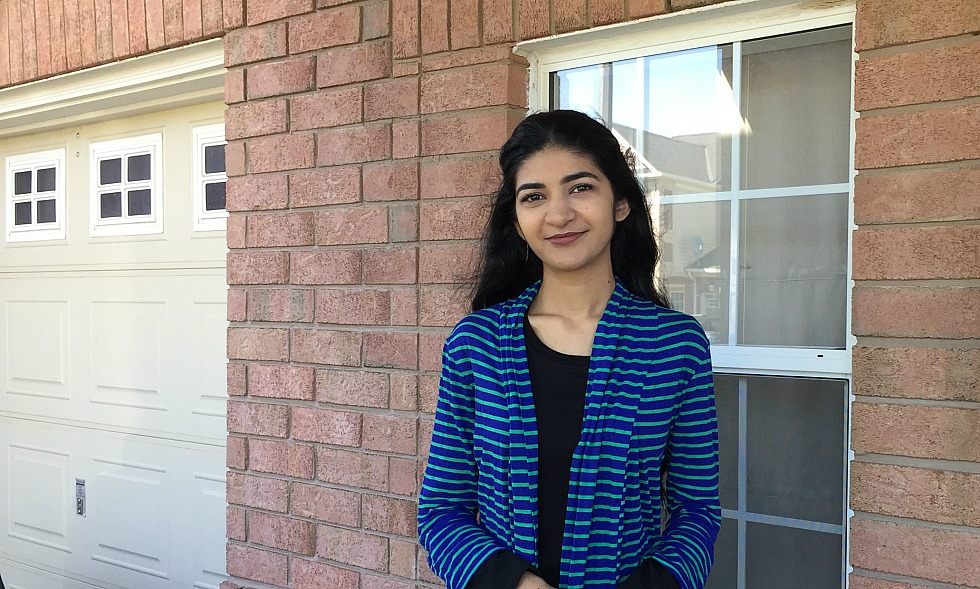“In university, you get what you give,” says Humanities graduate

Nimra Khan is an aspiring speech therapist who is graduating Summa Cum Laude this week from the Honours Cognitive Science of Language program.
Of the many lessons she learned in her time at McMaster, Humanities graduate Nimra Khan says learning to take chances was one of the most valuable.
“Taking risks helped shape me into the person I am,” says Khan, an aspiring speech therapist who is graduating Summa Cum Laude this week from the Honours Cognitive Science of Language program.
“In university, there are so many opportunities open to you and all these avenues to help you actually pursue them – you just have to take a chance and dive in.”
With her affinity for languages – she speaks fluent Urdu and has studied French and Japanese, among other languages – combined with her interest in psychology, Khan says her program was a natural fit. She threw herself into both her course work and extracurricular activities, volunteering at speech therapy clinics and seeking out ways to cultivate her love of art, writing and design, while helping other students in the process.
“In university, you get what you give,” she says. “I wanted to keep trying things and to expand my personal skills – there were all these opportunities to do that sitting right in front of me.”
She joined the McMaster Linguistics Society where she helped first year students acclimatize to university and where she put her design skills to use, creating posters and other digital communications to help the Society spread the word about upcoming events.
She volunteered at Incite Magazine, a student publication devoted to creative arts and writing, beginning as a contributor, then eventually applying to become an editor, mentoring other students and helping them develop their writing skills.
Khan also found ways to combine her creative pursuits with her coursework. While taking a neuroscience course called MacEngaged – in which students work in groups to create community engaged projects – she used her graphics skills to animate a video on the dangers of concussions.
“I was really interested in educating other students about this issue in a really approachable way,” says Khan, whose interest in concussions continued to grow, eventually prompting her to contact John Connolly, Professor and Sir William McMaster Chair in Cognitive Neuroscience of Language, to ask if she could volunteer in his lab.
“I remember emailing him the summer before my last year started and thinking, ‘he’s going to say no. I have no experience, I’m just someone whose interested.’ But I thought, ‘what do I have to lose?’ So, I just sent the email and he replied very quickly and said, ‘Yes, I’d love to have you on the team.’”
Khan says the experience helped her see research through a different lens. “As an undergraduate you read all these research articles, but you don’t actually get to see, step-by-step, how research is conducted,” she says. “You can talk about it in courses, but it’s not the same as actually seeing it – I enjoyed the hands-on experience.”
Khan is planning to pursue a career as a speech therapist and is currently volunteering at a speech therapy clinic in her hometown of Milton, Ontario.
“Speech therapy is the only career path that really fits all my interests all into one,” she says. “I love the idea of helping someone recover from something emotionally and physically – maybe they had a stoke or something traumatic happened to them. I also love working with children and creating fun activities that fit with my interests in art and creativity.”
Looking back, she says the key to her success was finding ways to get involved and grow her interests. Although she knows first-hand that it can sometimes be difficult for students to take the plunge, she says the reward is well worth the risk.
“I was scared when I was applying for a lot of these things and I was scared in terms of how I would manage them,” she says. “Sometimes I think I took on too much in one term but then, by the time the term was over I was glad I did because it made me more involved with the university – it made me feel more a part of it all.”
Watch Khan’s MacEngaged video, Breaking Down Brain Damage: Concussions:


